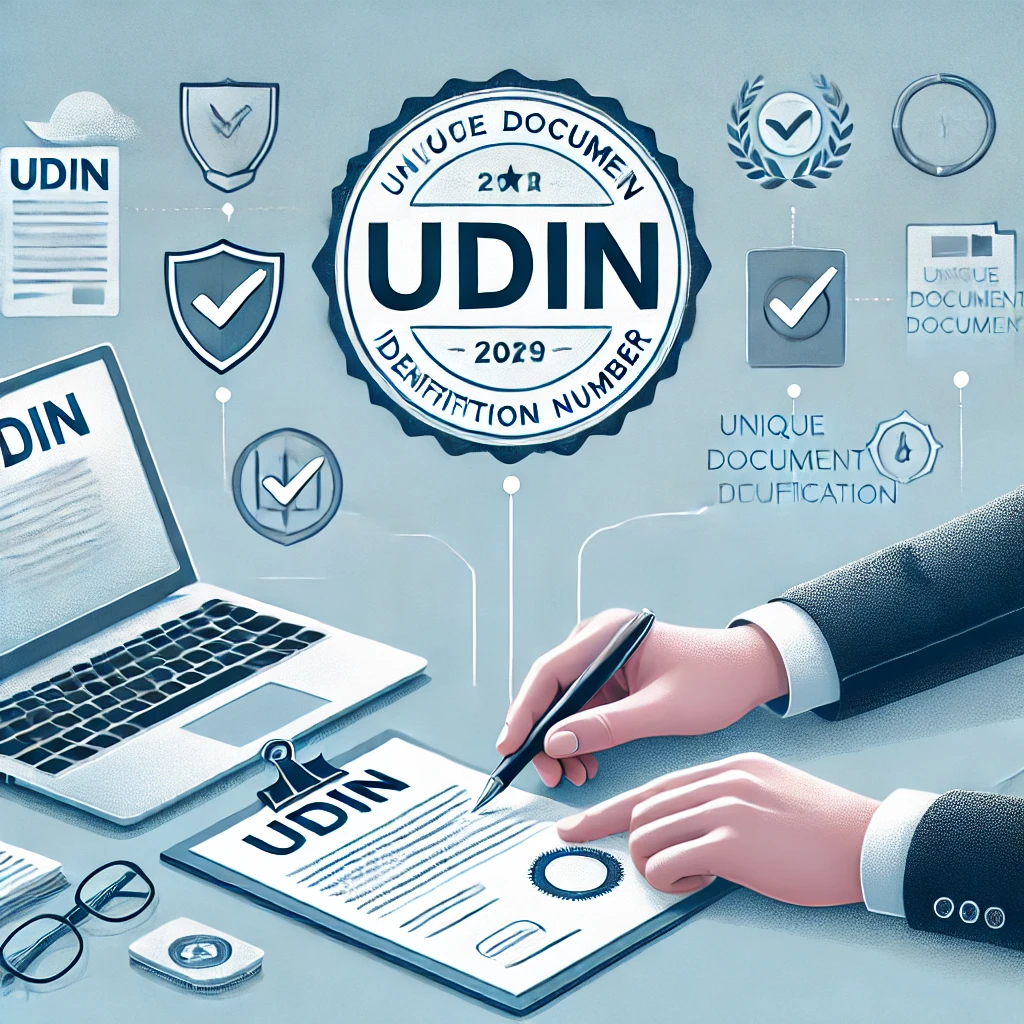Introduction and Purpose

The Unique Document Identification Number (UDIN) is a distinctive reference code used by Chartered Accountants to authenticate and validate documents they sign. Introduced by the Institute of Chartered Accountants of India (ICAI) in 2019, UDIN aims to prevent fraudulent practices in the financial sector and to ensure that documents are legitimate, traceable, and reliable.
It is mandatory for practicing Chartered Accountants to generate UDIN for certificates and reports as specified by the ICAI to enhance transparency, security, and accountability in professional documentation.
Structure and Generation of UDIN
A UDIN is created through an online portal where professionals input key details about the document. The structure of a UDIN typically includes:
- Document Type: The kind of document, such as audit reports, tax audits, or financial statements.
- Date: The date when the document was signed or issued.
- Unique Identifier: An alphanumeric code associated with the professional’s credentials, such as their membership number or license.
- Verification Code: A segment that helps verify the authenticity of the document.
Once a professional, such as a chartered accountant, signs a document, they generate the UDIN by entering the document details into the portal. The system then assigns a unique identifier, which is embedded in the document and can be easily verified by stakeholders.
Documents Requiring UDIN (few Examples)
| Document Type | Applicability |
| Audit Reports | Statutory, Internal, and Tax Audits |
| Certificates under Companies Act | Turnover, Net Worth, etc. |
| GST Audit Reports | Annual GST Audit under GST Act |
| Financial Statements | Certified Balance Sheet, Profit & Loss |
| Tax Filings | Tax Audit Reports under Sec 44AB |
| Bank Certificates | Stock, Net Worth, and Fund Flow Certificates |
Benefits of UDIN
- Security and Authenticity: UDIN ensures that every document is traceable back to the professional who signed it, minimizing the risk of fraud or forgery.
- Transparency: It provides a transparent system where all stakeholders can verify a document’s legitimacy.
- Accountability: By linking the document to a specific professional, UDIN holds individuals accountable for the content of the document.
- Fraud Prevention: The UDIN system acts as a deterrent to fraudulent practices, making it easier for regulators and companies to verify documents.
- Easy Verification: The UDIN platform allows stakeholders to easily confirm the legitimacy of documents, reducing the time and effort involved in manual verification.
Challenges and Future of UDIN
While UDIN has brought many improvements to document verification, challenges still exist. These include the need for continuous updates to the system, greater awareness of the platform, and proper training for professionals on how to use it effectively. Despite these challenges, the system is expected to evolve and expand into other sectors, further enhancing the standards of professional integrity and trust across industries.
Verification of UDIN
To check the Unique Document Identification Number (UDIN), you can follow a simple online verification process. Here’s how you can do it:
Steps to Verify UDIN
Step-by-step UDIN Verification Process:
- Visit the ICAI UDIN Portal: https://udin.icai.org.
- Navigate to the Verify UDIN section.
- Enter the 18-digit UDIN provided on the document.
- Click on Verify.
- Review details including:
- Professional’s Name and Membership Number
- Document Type and Date
- UDIN Status (Valid/Invalid)
- Cross-check these details with your document.
If UDIN is Invalid:
- Recheck the UDIN entered.
- Contact the issuing Chartered Accountant for clarification.
Why UDIN Verification is Important:
- Document Authenticity: Verifying UDIN ensures that the document you are dealing with has been legitimately signed by a certified professional.
- Fraud Prevention: The system helps to detect fraudulent or fake documents by validating whether the UDIN is linked to the correct professional.
By following these steps, you can easily verify the authenticity of any document that has been issued with a UDIN, ensuring its legitimacy and preventing potential fraud.
Conclusion
In conclusion, the Unique Document Identification Number (UDIN) plays a vital role in enhancing the security and transparency of professional documents, particularly in the fields of accounting and auditing. By ensuring document authenticity and providing an efficient means of verification, UDIN helps reduce the risk of fraud and improves accountability in financial reporting and other professional certifications. As the system continues to develop, it is expected to further establish trust and reliability in the documentation process, fostering a more secure and transparent environment for businesses, professionals, and regulators alike.
Author
Mr. Jeny C. Paul
Intern
Pavan Goyal and Associates (Chartered Accountants)
Office No. B212, GO Square, Mankar Chowk, Wakad, Pune 411057
Email – office@goyalca.com
Contact – 9762763351